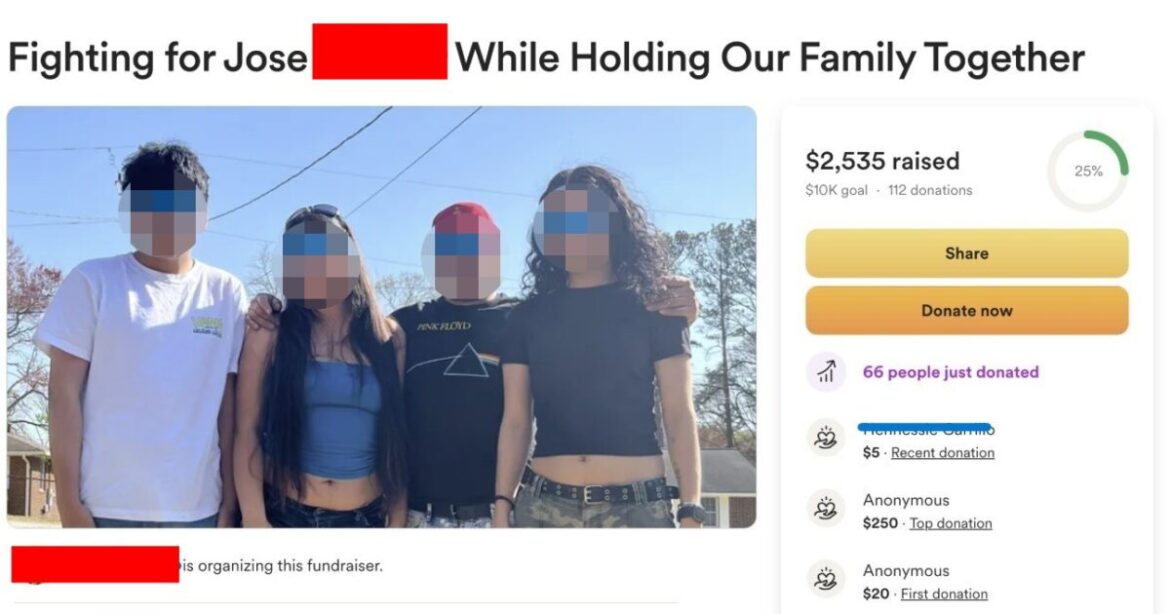The Rise of Emotion-Driven Fundraisers for Deportation Cases Lacks Legal Grounding
Across the country, a growing number of GoFundMe pages are appearing with a consistent formula: a family member is detained by ICE, and their U.S. citizen child—often in their late teens or twenties—launches an emotional fundraiser begging the public for financial support to fight deportation. Yet conspicuously absent from these campaigns is any claim that the detained individual is lawfully present in the country.
In a recent example, a 22-year-old Atlanta resident pleads for help: “My father was detained in the Tallahassee ICE raids. He’s lived here for 24 years with no criminal record.” After being unaccounted for over two days, the family learned he had been transported to El Paso. The appeal ends with a call for donations so they can stay together in the U.S.—despite the father’s admitted lack of legal status.
Emotional Pleas vs. Legal Reality
This model—emotional storytelling without legal justification—has become a template for both fundraising and media sympathy. Buzzwords like “father,” “student,” “honor roll,” or “community pillar” are strategically deployed to humanize the subject and steer public focus away from the fact that the person being deported is not a legal resident.
They’re not deported for being parents or good neighbors. They’re deported for violating federal immigration law—either by entering illegally, overstaying a visa, or ignoring a deportation order. These cases are not rare oversights—they are deliberate infractions of established law, even if committed years ago.
The ‘Anchor Baby’ Illusion
Many fundraisers are launched by U.S. citizen children—products of the very immigration loophole some call the “anchor baby” phenomenon. Despite liberal denials of its existence, the real-world outcome is unmistakable: a child born on U.S. soil becomes a foothold for a family’s argument against deportation. The legal difference between the citizen child and undocumented parent is blurred, intentionally, to generate sympathy and fundraising momentum.
A campaign recently praised parents who had lived in the U.S. for “nearly four decades,” raised three daughters, and welcomed their first grandchild. Nowhere did it mention that the parents ever obtained legal residency. Instead, it emphasized how “this cruel and unjust situation” had shattered the family—never explaining how the legal system is unjust for enforcing its own laws.
Playing the Victim Card
These GoFundMe narratives frequently lament detention conditions. Complaints range from open-bay showers to transfers between facilities—routine processes in any secure facility, from the military to college dorms. While not luxurious, detention is designed to be functional and secure, not accommodating for families’ convenience.
Ironically, critics demand more humane treatment and closer proximity to families—suggesting, implicitly, that the U.S. should build more ICE detention centers. A demand they likely don’t realize they’re making.
The Media’s Role in the Charade
Mainstream media outlets amplify these stories, echoing the fundraisers’ emotional tones while omitting hard legal facts. A woman detained at JFK is portrayed as a helpless mother rather than a visa violator. Another deportee is labeled a “beloved community member” without any inquiry into their immigration status.
In reality, these campaigns are often less about justice and more about optics: public relations battles waged with hashtags, tearful testimonials, and carefully framed narratives that ignore the one fact that matters—legal status.
Conclusion: Laws, Not Tears, Should Guide Policy
There’s no cruelty in enforcing immigration law. There’s no injustice in detaining someone who violated legal entry procedures. And there’s no constitutional right to remain in the United States simply because you’ve lived here a long time or have children born here.
Fundraisers, media campaigns, and public sympathy don’t change the law. They only obscure the truth—that immigration enforcement isn’t an attack on families, but a necessary defense of sovereignty.
If we allow emotion to replace law, we haven’t just weakened the system—we’ve surrendered it.

